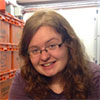Day 1 of volunteering at National Museums Scotland and I had no idea what the next six weeks here would be like. I met Trevor Cowie (Scottish History and Archaeology Department) in the Arrivals Hall, and after a quick coffee we set off into the rabbit warren behind the scenes at the Museum.
In October I had met Trevor at an archaeology conference in Inverness. I was volunteering for the conference organisers, Highland Council Historic Environment Team, at the time. I was looking to get more experience and could not believe it when Trevor thought it might be possible for me to spend some time at National Museums Scotland.
Whilst the whole genre of Scottish Archaeology captivates me, I’ve always had a particular soft spot for the great ‘Atlantic roundhouses’: the Brochs of Northern and Western Scotland. So when I found out that the project chosen for me to work on was with the Broch of Gurness… well, you can imagine that I had a particularly large grin on my face.
Although the excavated finds from this well-known Orkney site have been part of the national collections for many years, the detailed published catalogue had never been converted into an electronically accessible format, making accessing the information and managing the collection difficult.
So there I was a few weeks later, ready to start. Whilst Trevor had agreed to be my Line Manager as it was an archaeological subject, I was to be supervised and guided by Jo Macrae (Collections Services). I was shown to my own desk with a laptop for me to use and presented with the sacred book that would be my life for the next few weeks: ‘Bu, Gurness and the Brochs of Orkney. Part II: Gurness’ by John Hedges.
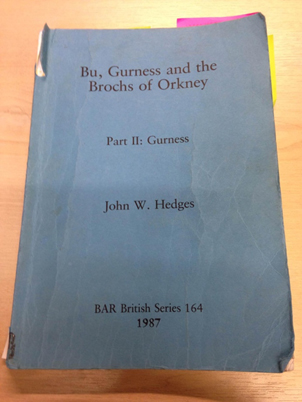
Jo had a spreadsheet set up for me ready to input the catalogue data. She showed me what to do, guiding me along as I started to figure out the system and soon had me racing through the catalogue as I got to grips with it all. Over the next few weeks I was welcomed whole-heartedly into the Collections Services team (and cannot thank you all enough for that) and got into a routine working through the catalogue.
The Broch of Gurness really is quite a site; a complex series of stone buildings embracing the solid broch tower at their heart. It is thought to have been occupied from around the 1st to 2nd century BC, and was used on and off from then onwards through the Pictish period in the 5th to 8th century AD, and again by the Vikings around the 9th to 10thcentury AD. This long and complex history meant that a whole range of artefacts were discovered at the site: stone tools, animal bones and human remains, reworked Roman glass, bronze brooches, iron knife blades, spindle whorls, pins, rings, chains, needles, querns, pounders, grinders, gaming equipment… and lots of pieces of pottery, to name but a few. And let’s not forget the remains of an Orkney Vole or a Conger Eel.
Two of the most elaborate and intriguing objects in the collection are the pair of oval (or tortoise) brooches, with highly decorative zoomorphic ornamentation, as can be seen below.
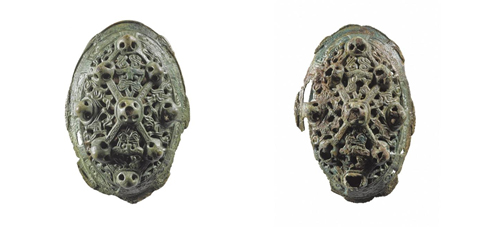
After a few weeks working away on the data, Jo and Trevor organised to take me down to the stores to have a look around. I felt like a little kid in a toy shop as every drawer held new delights. I was treated to trays full of flint arrow heads, stone axe heads, spindle whorls, pots, a log boat and we even hunted down some of the pieces from the Gurness collection that I’d been working on, including faunal remains and stone tools. I genuinely feel privileged to have had a glimpse into the vast stores of artefacts safely tucked away behind the scenes.
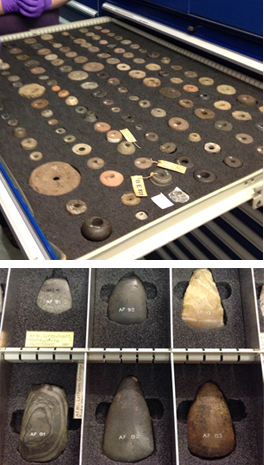

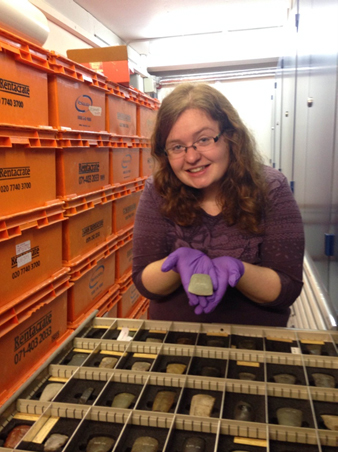
Back in the office I finished off the data input with a good chunk of time left to spare. Jo kindly decided to show me how everything I had achieved could be integrated into the collections database. Once everything was uploaded, I went through the catalogue again and added in all of the dimensions to the 2,121 database records I had created. I only had a week left before Christmas. Jo bet me that I couldn’t get all the dimensions in before the holiday break, if I did she would eat her hat (or head, depending on who you ask). Luckily for Jo’s hat, I didn’t finish in time… However, it was a close call, as within two hours of my first day back in January, it was done!
For my final week here, I am going to be getting some more experience working in the database under the excellent supervision of Jo. So far, I have learned a great deal about working in the museum, about the things that need to be done that I had never even thought about before.
If you are interested in the Broch of Gurness collection there are a few items on display in the Early People gallery in the museum. These including: a bone die, two bone combs, a pinhead, a handled steatite bowl and an inscribed knife handle, amongst others. I have included a list of where and what you can find – so go and have a look!
I just want to say thank you to everyone who has been a part of this and made it possible, I won’t forget it.
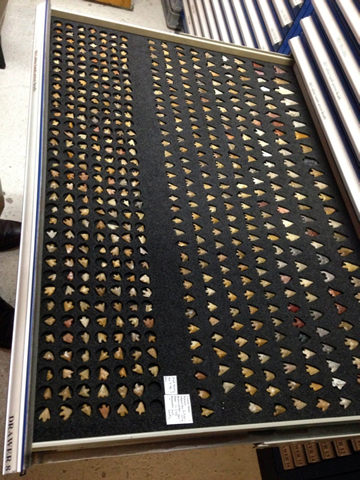
|
Description |
Gallery |
Section |
Case no. |
Label no. |
|
Handled Steatite bowl |
Early People gallery |
Fat of the Land |
B5 |
6 |
|
Decorated bone handle |
Early People gallery |
Made of Bone |
E4 |
18 |
|
Perforated antler tine used as a handle |
Early People gallery |
Made of Bone |
E2 |
8 |
|
Mount of perforated antler |
Early People gallery |
Made of Bone |
E2 |
17 |
|
Early People Gallery |
Early People gallery |
Made of Bone |
E2 |
17 |
|
Perforated sheep metacarpal |
Early People gallery |
Made of Bone |
E3 |
5 |
|
Long handled weaving comb of cetacean bone |
Early People gallery |
Made of Bone |
E6 |
8 |
|
Long handled weaving comb of cetacean bone |
Early People gallery |
Made of Bone |
E6 |
8 |
|
Perforated pinhead or playing piece made of bone |
Early People gallery |
Made of Bone |
E3 |
16 |
|
Vessel for storage, cooking or serving |
Early People gallery |
Baking the Earth |
K5 |
14 |
|
Bone rib, possibly a pottery tool |
Early People Gallery |
Baking the Earth |
K2 |
6 |
|
Glass ball |
Early People gallery |
Broken Glass |
M4 |
16 |
|
Ogham-inscribed knife handle |
Early People gallery |
Letter of Authority |
T7 |
6 |
|
Bone die |
Early People gallery |
Tilling the Soil |
C5 |
4 |
